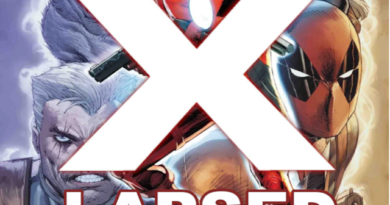Reggie and Me – The “New” Comics Code Authority?
Going to try and wrap this series up today… there are only a couple more things that I wanted to touch upon. One will definitely go “against narrative”… the other, might just tick some people off.
Let’s start with “What Ever Happened To…” Dr. Frederic Wertham?
Wertham’s crusade against violence in media would evolve with the times. Come 1963, he was more focused on the violence that might appear on the big and small screens rather than on the comics page. He’d even go so far as to debate Alfred Hitchcock on the subject! Of particular note, among the first words out of Wertham’s mouth during the debate were that he didn’t see Psycho. So, perhaps this was more Hitchcock vs. Half-cocked.
Wertham would write more on the subject of violence in media. The Circle of Guilt (1958) claimed that, due to media, Americans were beginning to feel less responsible for their actions. Stands to reason, doesn’t it? When every crime, murder, and delinquency gets blamed on a piece of media… rather than the individual (or the parents of an individual), it’s easy to no longer feel responsible for what we do. Why blame a criminal or a bad parent… when we’ve got all these wonderful Boogeymen?
A Sign for Cain: An Exploration of Human Violence (1965), was based more on culture than any one piece of media… though, it is in this book that Wertham takes credit for “putting 24 out of 29 crime comic book publishers out of business.” He blames culture’s acceptance of media for making violence an acceptable way of dealing with everyday problems in life. All of this is fostered in the “devaluation of human life”… he goes on to discuss/compare with Nazi propaganda and whatnot as well. This book, it’s worth noting, is not written in the more layman/casual/average Joe language of Seduction of the Innocent.
Let’s jump to the end of Wertham’s life… where, check this out… he actually sort of came around to comics! This was something they left out of my comics history textbook… and, from the looks of the attitudes of the internet, I don’t think I’m alone in that. He’d become very interested, not only in the comics themselves, but the culture and fandom surrounding them. Now, this is interesting for a number of reasons… but, one I’d like to address here is: comics were no longer viewed as being “just for kids”. Sure, there are folks even to this day who look at comics as kid’s stuff… but, that’s always going to be the case. What I’m trying to say is, the average reader of a superhero comic in the late-1940’s into the 1950’s, probably looked a lot different than the superhero fan of the early 1970’s.
Wertham would actually write-in to comics fanzines. He became very defensive of his role in “the day the comics died”. He’d state that he is firmly against censorship… which, I mean, we may never know how true that statement actually is. He stated that he had no part in the creation of the Comics Code. This is technically true… though, if you were to post that statement on Twitter, you’d likely be bullied off the platform.
In fact, Wertham thought the Code Seal was worthless! He’d be quoted in the Seattle Star as saying, “At present it is far safer for a mother to let her child have a comic book without a seal of approval than one with such a seal.” He would address the Kefauver Hearings, and claim that his only role in them was as an “expert witness”. This is another true statement. He also claimed that he never called one single comic book “terrible”. He “never judged comics as ‘good’, ‘bad’, or ‘the worst’.” I’d have to do some digging to confirm this, but… from what I can recall, I might suggest he ever even read one of the comics he was rallying against to completion.
In 1973, at 78-years old, Dr. Frederic Wertham would publish The World of Fanzines: A Special Form of Communication.
In it, he would applaud and celebrate the comics fandom subculture. He would go against the narrative that would come to proceed him (by people who have no idea what they’re talking about) by saying: “Fandom is not subversive; it is special”. He is especially fond of the Zines, calling them “a constructive and healthy exercise of creative drives.” He saw fandom… comics fandom in particular as a… get this… positive force in the individual growth of teenagers.
During his later years, Wertham would get heaps of hate-mail… and, check this out… the Boogeyman, the man who “killed comics” and couldn’t be reasoned with… personally responded to most of it. Yeah, that bit was left out of my history textbook as well. It’s almost like comics fandom needs a Boogeyman… the same way Wertham and Kefauver did back in the 1950’s, innit? It’s pretty crazy how fans put themselves “above” the Werthams of the world… when many of us are just as bad.
One last thing about the Doc. He was invited to… and actually attended one of Phil Seuling’s early comic book conventions! It was the 1973 New York Comic Art Convention. Wertham showed up… was led to his panel, annnnnd was roundly heckled and treated very poorly by comics fans. I’m going to guess that these comics fans were just as knowledgeable about the establishment of the Comics Code and Wertham’s part in it as the fans today… which is to say, they weren’t… like, at all. Dollars to donuts, not a single one of ’em ever uttered the word “Kefauver”.
Think about that for a second. Frederic Wertham appeared on panel at a comics convention… and rather than viewing it as the historic moment that it was… these jackasses chose to heckle him and run him off the stage. Could you imagine reading a transcript of Wertham dealing directly with the passionate and knowledgeable comic book fans of the 1970’s? What a missed opportunity… just think of the history we lost because people had to be jerks.
Those jerks were successful in silencing Wertham once and for all. He’d leave the show, and never wrote about comic books again. Again, right after he’s officially “on our side”… we run him off. What an absolute waste.
This brings us neatly into our final piece of this project… the “New” Comics Code Authority… also known as social media. At the time Reggie and I recorded the fifth, and final episode of the Comics Code series… there were several “hot-button” (non) issues floating around on Social Media pertaining to social-regulation. Let’s talk about a few here.
First, the variant cover to Batgirl #41:
Again, I’d like to stress that this was going to be a variant cover to Batgirl #41… which was during one of DC’s Anniversary gimmick-months. Most every book DC put out was going to get a Joker-themed variant. So, yes… a variant… meaning, if you don’t want to buy a book with this on the cover… you don’t have to.
A (successful) social media campaign was put together to get this cover cancelled… likely by the very same sort of people who might tweet out an image of the CCA seal while lambasting it as “oppressive” and “hateful”. Here’s the question though… is this a form of censorship? Just because it isn’t the government or an industry regulating content… does that make it any less censorious? Clearly, those who were actually offended (which I’m guessing were very few of the mob), did not have to buy this. Were they worried that it would be successful? That it would further cement A Killing Joke into Barbara Gordon’s backstory? This is a whole nother kind of narrative control, innit?
A buzz-phrase hitting the rounds during this non-event came from the then-Batgirl creative team. It was “not on our watch”… referring to making reference to A Killing Joke. Fans of the this creative team were quick to jump in, and make claims that we don’t want this in our comics (likely the same sort of folks who complain daily about fan-entitlement). Were the campaigners (and creative) worried that, had this variant made a favorable “splash” at market, it would render many of their own talking points null and void?
Another contentious piece of business was the Milo Manara “butt-cover” from one of the many variant covers from one of the many #1 issues of Spider-Woman (does anybody ever buy that book?):
Placed next to Spider-Man in the same pose for emphasis. Now, Milo Manara (1998 Jack Kirby Hall of Famer) is… kind of an erotic artist. When you hire Manara to draw women, you sorta know what you’re likely to get. Here’s the big question… if not for the social media “outrage”… would anyone have given this cover a second thought? I’d suggest not. Whatever the case, the “New” Comics Code Authority… aka social media, “censored” another variant cover. It doesn’t take much digging on your Google Machine to find more cases of this.
I find it to be very hypocritical, personally… especially when you see how many of the internet activists claim to be champions of the First Amendment, and 100% against censorship. Ya gotta pick a lane… what makes this “New” Comics Code any better (or more righteous) than the old one? You can’t call Wertham a Boogeyman for stifling creativity… and then go and… stifle creativity. Censorship isn’t a “half-pregnant” scenario… you’re either for it, or against it.
There’s plenty about “current year” comics that I can’t stand… stuff that makes me roll my eyes so hard I almost do a back-bump… here’s the thing though, I just choose not to read it. I don’t rail against the companies and demand things I don’t like be cancelled. I might complain here or among friends, but I never demand cancellation. Just because I don’t like something doesn’t mean there isn’t someone who does. Even if it’s just one person who likes it… they have every right to have it and enjoy it. The “invisible hand” is a thing. If Marvel/DC/whoever aren’t making that money, they won’t support the project. If you don’t like something… don’t buy it. Let the invisible hand do its job… or, are you afraid you might be wrong? That the stuff you don’t like… is actually popular? Just something to think about.
I think I’ll leave it here. I hope this past week and change of discussing the Comics Code Authority has been an enriching experience… I know it’s certainly helped me with the healing process. If nothing else, I hope it changed your perceptions on much of the established narrative you might find online… especially as it pertains to Dr. Wertham. He wasn’t perfect… he did have an agenda… but, he wasn’t the Boogeyman. If you need to point blame… just think about Kefauver’s Kangaroo Court in 1954.
The next time you see someone share the cover of Seduction of the Innocent they stole from Google Images, with a bunch of karma-farmy half-truths… just smile with the realization that you now know a whole lot more about that book, and it’s author than they do.








This was a very informative and entertaining series. The history of the comic book industry is one of my obsessions currently. This series was on par with the half dozen books I have read about comics history. I highly recommend it.
For me social censorship has always existed across all mediums. Movies, TV, books, art, comics, etc… I have always believed that if you don't like it don't buy it. (Or read it or watch it as the case may be.)
There was an old saying about TV that applies here. "If you don't like what is on the channel, change the channel."
I second Chris U. I learned a lot of stuff tonight. Great work!